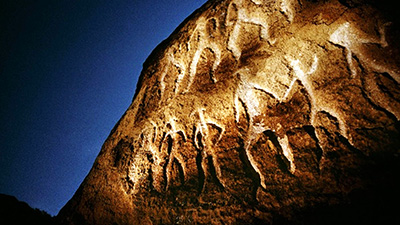The Earliest Humans
Teacher Resources
Driving Question: What caused some humans to shift from foraging to farming and what were the effects of this change?
For hundreds of thousands of years, our species lived as foragers. Then, about 12,000 years ago, some foragers started to experiment with farming, kicking off the Neolithic Revolution and setting the stage for huge transformations.
Learning Objectives:
- Understand how historians use interdisciplinary evidence to craft narratives about early human communities.
- Evaluate the positive and negative effects of the transition to agriculture.
- Identify the major changes and continuities in the three frames that accompanied the transition to agriculture.
Vocab Terms:
- agricultural
- forage
- nomadic
Opener: The Earliest Humans
To teach this lesson step, refer to page 2 of the Lesson 2.1 Teaching Guide.
For more information about why OER Project uses openers in every lesson, check out our Openers and Closers Guide.
Early humans lived very different lives from us—how did that impact what they ate?
Looking Ahead
To teach this lesson step, refer to page 2 of the Lesson 2.1 Teaching Guide.
Get an idea of how other teachers use Unit Notebooks by checking out this conversation in the OER Project Teacher Community.
Agree or disagree? Evaluate some statements before you dive into Unit 2—then see how accurate you were when you get to the end of the unit.
The Earliest Humans
To teach this lesson step, refer to page 3 of the Lesson 2.1 Teaching Guide.
Check out our Reading Guide to learn about the Three-Step Reading approach.
Humans tend to stick with what works. That was most certainly true of our ancestors, who, for a long time, were foragers. But as some groups started farming, things started to change very quickly.
-
Guiding Questions
-
Before you watch
Preview the questions below, and then review the transcript.
While you watch
Look for answers to these questions:
- How did young people in the Paleolithic Southwest spend their free time?
- What does Paleolithic mean?
- What does Neolithic mean?
- What were the big changes in human societies that started farming? What changes were specific to the Sinagua?
- Why did Sinagua youths stop making figurines?
After you watch
Respond to this question: According to evidence in this video, was farming was positive or negative for human societies?
-
Guiding Questions
-
Before you read
Preview the questions below, and then skim the article. Be sure to look at the section headings and any images.
While you read
Look for answers to these questions:
- What does it mean to say that “the past is a foreign country”?
- How did humans get the food they needed for most of our species’ existence?
- What was the cognitive revolution and why was it important for our species?
- How did the transition from farming change the lives of the foragers who started farming?
After you read
Respond to this question: If you were to meet a forager living 50,000 years ago, can you think of anything you might share in common?
Framing Unit 2
To teach this lesson step, refer to page 5 of the Lesson 2.1 Teaching Guide.
Looking to deepen your understanding of frames? Take a look at this conversation in the OER Project Teacher Community.
This video and activity will help us use the frames to evaluate the impact of the transition from foraging to farming.
-
Guiding Questions
-
Before you watch
Preview the questions below, and then review the transcript.
While you watch
Look for answers to these questions:
- How did the cognitive revolution and the development of language help our ancestors survive and thrive?
- Watch the animation of humans populating the world. Where did humans first emerge? Where did we go next? What regions were populated last?
- What does the video argue was the biggest change of this era, through the frame of production and distribution.
- Did everyone become a farmer in this period? Why or why not?
- According to the video, why was the shift to farming important?
After you watch
Respond to this question: If you lived in the Neolithic period, would you prefer to be a farmer or a forager?
Closer: The Earliest Humans
To teach this lesson step, refer to page 7 of the Lesson 2.1 Teaching Guide.
You’ll learn more about farming and foraging in this unit, but for now, consider the benefits and disadvantages of both methods.





